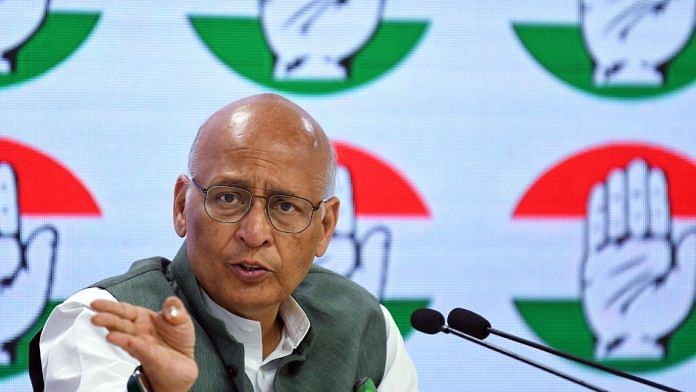New Delhi: In the politics of defection, ideology, loyalty, and even morality are overshadowed by the single-minded pursuit of power. This game of musical chairs was central to a discussion titled ‘Decoding Defection’ organised by the Vidhi Centre for Legal Policy at India International Centre on 10 April.
“You cannot legislate morality,” said Abhishek Manu Singhvi, former Rajya Sabha MP and senior Supreme Court lawyer in conversation with Arghya Sengupta, founder of and research director at Vidhi. The talk was the third in the Great Cases series, which was launched to foster discussions on landmark rulings that have shaped the Indian Constitution. In a nod to inclusivity, a sign language interpreter conveyed what was being spoken about on stage.
Singhvi compared the rash of defections among Indian politicians to their counterparts in the United Kingdom and the United States. “Republicans will not become Democrats easily. [There are] hardly any examples of politicians switching parties because, at the end of the day, people believe that the electorate will punish you,” he said to a room filled with lawyers, former bureaucrats, and political science students.
He blamed a toothless ‘anti-defection’ law, which comes to a virtual halt during election season. In 1985, the 52nd Constitutional Amendment introduced the ‘anti-defection’ law through the Tenth Schedule, under which elected members can be disqualified for defection. But politicians have no fear of this because the final decision on their disqualification is taken by the Speaker.
But first, it has to be decided whether defection is a “constitutional sin” or not.
“If you decide it’s not a sin but merely an infraction then don’t be holistic or sermonise, and there’s no need to have any debate,” Singhvi said.
Also read: India’s anti-defection law didn’t stop power politics. It just moved from farmhouse to resort
‘Speaker isn’t neutral’
Singhvi suggested three steps to deter political leaders from switching parties and causing governments to collapse.
“First, create a very high-powered constitutional commission which will decide defection matters. Second, plug the loopholes,” he suggested. The anti-defection law, for instance, does not apply when two-thirds of one party’s members switch to another party. “Third, you must change Clause 15 of the Election Commission Symbols Order,” he said.
Singhvi also questioned the Tenth Schedule and argued for it to be scrapped. He strongly stated that the “time has come to abolish the persona designata of the Tenth Schedule”, i.e. the speaker. The whole system is flawed given that more often than not, the Speaker of the same party that a politician has defected to is the ultimate decider on whether he or she will be disqualified. “How can there be objectivity? It’s ridiculous to expect a Speaker to be neutral,” he said.
Singhvi had a personal bone to pick with the flaws in dealing with defection. He even joked about how he has a “unique qualification having been a victim of defection”. Recently, Singhvi moved the Himachal High Court challenging the interpretation of the draw of lots rules after he tied with BJP’s Harsh Mahajan and lost the Rajya Sabha polls in the state.
Also read: Defections are a threat beyond election results today. Here are five ways we can fix it
Education and the Constitution
At some point in the discussion, the Congress leader brought up the critical role of Governors. BR Ambedkar could not have envisaged how governors would keep delaying assenting to bills. Power must be exercised with discretion. “Everything can’t be done in the Constitution,” he said.
When the session was opened to the audience, a gentleman asked if having a minimum educational qualification for elected officials could solve the problem of defections.
“I don’t think education will solve any problem. In fact, this [an educational requirement] was debated for many pages in our constitutional debate and finally, it was decided against,” Singhvi replied.
The great revolution of the Constitution was that the largest democracy was carved out of one of the poorest countries. But how it is implemented is a challenge. He turned to Ambedkar for an answer, who had said: “However good a constitution may be, if those who are implementing it are not good, it will prove to be bad. However bad a constitution may be, if those implementing it are good, it will prove to be good.”
(Edited by Theres Sudeep)



